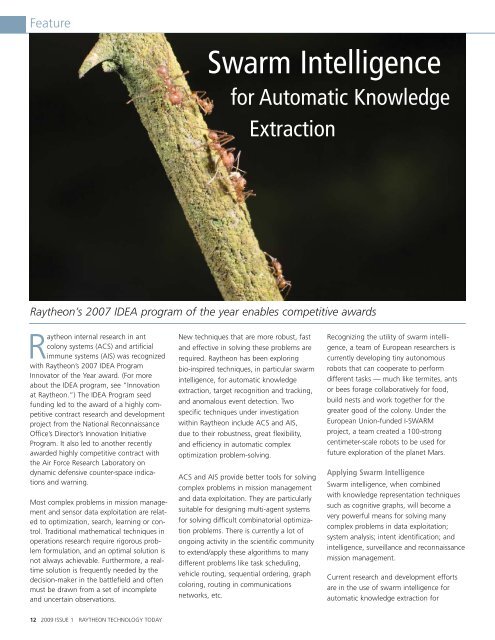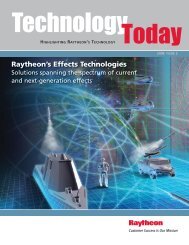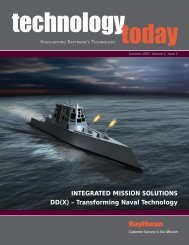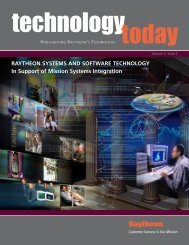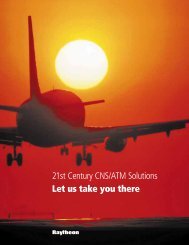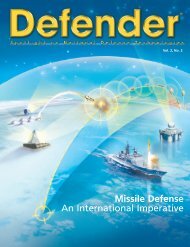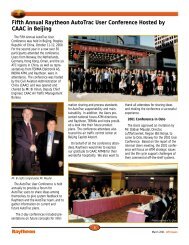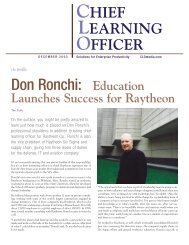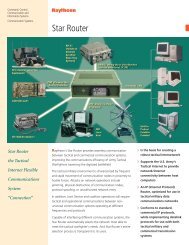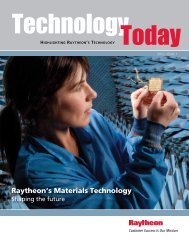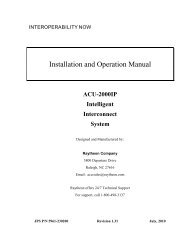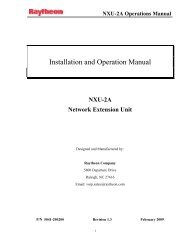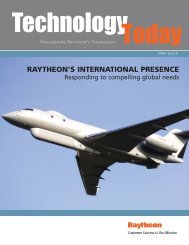2009 Issue 1 - Raytheon
2009 Issue 1 - Raytheon
2009 Issue 1 - Raytheon
Create successful ePaper yourself
Turn your PDF publications into a flip-book with our unique Google optimized e-Paper software.
Feature<br />
<strong>Raytheon</strong> internal research in ant<br />
colony systems (ACS) and artificial<br />
immune systems (AIS) was recognized<br />
with <strong>Raytheon</strong>’s 2007 IDEA Program<br />
Innovator of the Year award. (For more<br />
about the IDEA program, see “Innovation<br />
at <strong>Raytheon</strong>.”) The IDEA Program seed<br />
funding led to the award of a highly competitive<br />
contract research and development<br />
project from the National Reconnaissance<br />
Office’s Director’s Innovation Initiative<br />
Program. It also led to another recently<br />
awarded highly competitive contract with<br />
the Air Force Research Laboratory on<br />
dynamic defensive counter-space indications<br />
and warning.<br />
Most complex problems in mission management<br />
and sensor data exploitation are related<br />
to optimization, search, learning or control.<br />
Traditional mathematical techniques in<br />
operations research require rigorous problem<br />
formulation, and an optimal solution is<br />
not always achievable. Furthermore, a realtime<br />
solution is frequently needed by the<br />
decision-maker in the battlefield and often<br />
must be drawn from a set of incomplete<br />
and uncertain observations.<br />
12 <strong>2009</strong> ISSUE 1 RAYTHEON TECHNOLOGY TODAY<br />
Swarm Intelligence<br />
for Automatic Knowledge<br />
Extraction<br />
<strong>Raytheon</strong>’s 2007 IDEA program of the year enables competitive awards<br />
New techniques that are more robust, fast<br />
and effective in solving these problems are<br />
required. <strong>Raytheon</strong> has been exploring<br />
bio-inspired techniques, in particular swarm<br />
intelligence, for automatic knowledge<br />
extraction, target recognition and tracking,<br />
and anomalous event detection. Two<br />
specific techniques under investigation<br />
within <strong>Raytheon</strong> include ACS and AIS,<br />
due to their robustness, great flexibility,<br />
and efficiency in automatic complex<br />
optimization problem-solving.<br />
ACS and AIS provide better tools for solving<br />
complex problems in mission management<br />
and data exploitation. They are particularly<br />
suitable for designing multi-agent systems<br />
for solving difficult combinatorial optimization<br />
problems. There is currently a lot of<br />
ongoing activity in the scientific community<br />
to extend/apply these algorithms to many<br />
different problems like task scheduling,<br />
vehicle routing, sequential ordering, graph<br />
coloring, routing in communications<br />
networks, etc.<br />
Recognizing the utility of swarm intelligence,<br />
a team of European researchers is<br />
currently developing tiny autonomous<br />
robots that can cooperate to perform<br />
different tasks — much like termites, ants<br />
or bees forage collaboratively for food,<br />
build nests and work together for the<br />
greater good of the colony. Under the<br />
European Union-funded I-SWARM<br />
project, a team created a 100-strong<br />
centimeter-scale robots to be used for<br />
future exploration of the planet Mars.<br />
Applying Swarm Intelligence<br />
Swarm intelligence, when combined<br />
with knowledge representation techniques<br />
such as cognitive graphs, will become a<br />
very powerful means for solving many<br />
complex problems in data exploitation;<br />
system analysis; intent identification; and<br />
intelligence, surveillance and reconnaissance<br />
mission management.<br />
Current research and development efforts<br />
are in the use of swarm intelligence for<br />
automatic knowledge extraction for


